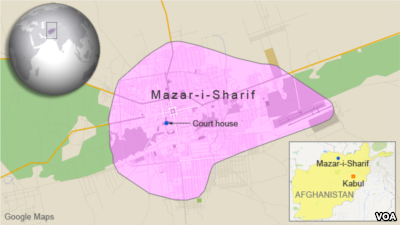
Mazar-e Sharif
Ayesha Tanzeem
VOA News
August 10, 2021
KABUL – With seven family members to feed, Abdul Khaliq needed the money. But Monday morning, his small fruit cart in Mazar-e-Sharif in northern Afghanistan remained devoid of customers.
“There is no business. There is fighting. … I am here since the morning, but I can’t make any money. People have nothing,” he told VOA.
Business in the capital of Balkh province came to a standstill, and shops started shutting down after news spread that the Taliban were advancing. The militants had already captured five provincial capitals in the north or northeast of the country since Friday. Monday morning, pro-Taliban social media accounts began saying the militants had attacked Mazar from four sides.
The claim was false — the only fighting reported was some 20 kilometers from the city near an army base in Dihdadi District — but the rumor traveled fast. For the population of Mazar, which had heard about the collapse of five nearby provincial capitals within two days, 20 kilometers was not far enough.
“We hear the Taliban are coming into Mazar city. … People are escaping. Fifty percent of the shops are closed, although the Taliban are still on the outskirts. But people are scared,” Mazar resident Hamid Askar said.
Worsening the panic were scenes from a day ago that went viral on social media. Kunduz, another city in the north only a few hours’ drive from Mazar, saw heavy fighting and was largely taken over by the Taliban.
Videos showed people running as plumes of black smoke rose in the air behind them. Tall orange and red flames were consuming parts of the city.
Mazar residents did not want to take a chance. Central Mazar’s busy streets became deserted. People lined up in banks and at ATM machines to withdraw money.
It did not help that another northern capital, Aibak of Samangan province, was overrun by the Taliban the same day — the sixth provincial capital to collapse since Friday. The militants now control most of the north.
In a country that has been at war for four decades, Mazar was one of the cities left relatively intact. It did not see heavy street-to-street fighting. This time, the residents seemed to be planning for a different outcome.
“The Taliban are coming. The city is collapsing. Anyone with money has escaped. The poor are left behind,” said shopkeeper Najibullah, who has only one name.
Witnesses said that during the panic in Mazar, they saw few security forces. Anyone who could afford it tried to escape. Travel agents had double the business they have on a normal day. Even airlines doubled their flights.
“Usually, we have two to three flights daily from Mazar to Kabul, but it has increased to five to six,” travel agent Sameer said. “Previously, the ticket was $85 one way, but now it has increased to $113.”
He said his office has seen a rush of people trying to get to safe locations ever since the security situation deteriorated in the neighborhood.
In the afternoon, the Afghan military released a video on social media saying it had repulsed the Taliban attack on Dihdadi District.
“Now, the presence of commandos in Kod-Barq area of Dehdadi district, #Balkh province. The terrorists attack on district repulsed; dozens #terrorists were killed and wounded in reciprocal operation of #commandos and Public Resistance Forces,” tweeted Defense Ministry spokesman Fawad Aman.
He later wrote that the Taliban had also been pushed back in northern Baghlan province.
The Taliban have made swift territorial gains in Afghanistan since May when the foreign forces started their withdrawal. President Joe Biden had received stiff criticism from political opponents and independent analysts for his decision to withdraw all forces before the Taliban made a political settlement with the Afghan government.
Negotiations between the two sides officially began in September 2020 but have so far remained fruitless.
The violence has exacerbated the already existing humanitarian disaster in Afghanistan. The country has had a severe drought for several years, and according to the United Nations, more than 18 million people, which make up half the country’s population, are now in need of humanitarian assistance.
Related

